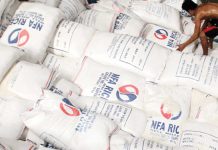
MANILA – Inflation slowed further in February to mark its fourth consecutive month of deceleration, according to data released by the Philippine Statistics Authority (PSA) on Tuesday.
According to the PSA, inflation – the pace at which consumer prices grow – clocked in at 3.8 percent in February, the slowest since the 4.3 percent in March 2018.
This compares with the 4.4 percent registered in January and the 4.5 percent recorded in February 2018.
The latest figure also marks the fourth consecutive month of deceleration after inflation was reported at 6.7 percent in October 2018, the fastest in over nine years since the 7.2 percent in February 2009.
In a press conference in Quezon City, PSA Assistant Secretary Josie Perez said the deceleration in February was driven by the drop in prices of three indices — food and non-alcoholic beverages, alcoholic beverages and tobacco, and transport.
For food and non-alcoholic beverages, there were slowdowns recorded in the growth of prices of rice; corn; meat; milk, cheese, and eggs; fruit; and vegetables.
In terms of transport, there was a slowdown in the increase of prices of petroleum and fuels for personal transport equipment; domestic airfare; and ferry ship fare.
According to Perez, the February print has yet to include the full effect of the second tranche of higher excise taxes imposed on fuel products.
“Nag-take effect siya, pero wala pa siyang effect this February 2019,” she said, noting that not all gasoline stations started to implement the second tranche during the period.
The Tax Reform for Acceleration and Inclusion (TRAIN), signed into law by President Rodrigo Duterte in 2017, also provides that starting 2019, excise taxes for diesel will be hiked by a total of P4.50 and those of gasoline by P9 under the second tranche.
Moving ahead, Asian Institute of Management (AIM) Economics Professor Emmanuel Leyco warned that the government should start taking preemptive steps to combat the possible effects of the expected El Niño.
“Ang food inflation ay isa sa pinakamalaking factors sa ating pagsukat ng inflation, at kung magkaroon tayo ng disruption sa ating agricultural production dahil sa El Niño, makakapagpataas ‘yan sa presyo ng mga bilihin,” he said in an interview.
State weather bureau PAGASA earlier forecasted a probable occurrence of El Niño which may come in during the first quarter of the year and may affect 47 provinces.
“‘Pag ka hindi natin na-address ‘yan ngayon pa lang, kasi alam naman nating mangyayari ‘yan, malamang ay tumaas uli ang inflation, at sana ‘wag namang mangyari ‘yun,” Leyco said. (GMA News)







